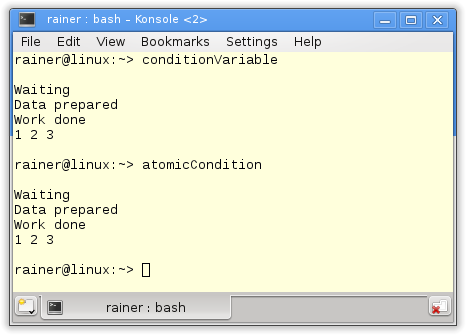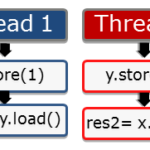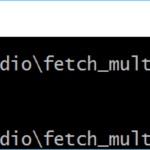The Atomic Boolean
The remaining atomics – in contrast to std::atomic_flag – are partial or full specializations of the class template std::atomic. Let’s start with std::atomic<bool>.
std::atomic<bool>
std::atomic<bool> has a lot more to offer than std::atomic_flag. It can explicitly be set to true or false. That’s enough to synchronize two threads. So I can simulate condition variables with atomic variables.
Let’s first have a look at condition variables.
1 2 3 4 5 6 7 8 9 10 11 12 13 14 15 16 17 18 19 20 21 22 23 24 25 26 27 28 29 30 31 32 33 34 35 36 37 38 39 40 41 42 43 44 45 46 47 48 49 |
// conditionVariable.cpp #include <condition_variable> #include <iostream> #include <thread> #include <vector> std::vector<int> mySharedWork; std::mutex mutex_; std::condition_variable condVar; bool dataReady; void waitingForWork(){ std::cout << "Waiting " << std::endl; std::unique_lock<std::mutex> lck(mutex_); condVar.wait(lck,[]{return dataReady;}); mySharedWork[1]= 2; std::cout << "Work done " << std::endl; } void setDataReady(){ mySharedWork={1,0,3}; { std::lock_guard<std::mutex> lck(mutex_); dataReady=true; } std::cout << "Data prepared" << std::endl; condVar.notify_one(); } int main(){ std::cout << std::endl; std::thread t1(waitingForWork); std::thread t2(setDataReady); t1.join(); t2.join(); for (auto v: mySharedWork){ std::cout << v << " "; } std::cout << "\n\n"; } |
And now the pendant with atomic booleans.
1 2 3 4 5 6 7 8 9 10 11 12 13 14 15 16 17 18 19 20 21 22 23 24 25 26 27 28 29 30 31 32 33 34 35 36 37 38 39 40 41 42 43 44 |
// atomicCondition.cpp #include <atomic> #include <chrono> #include <iostream> #include <thread> #include <vector> std::vector<int> mySharedWork; std::atomic<bool> dataReady(false); void waitingForWork(){ std::cout << "Waiting " << std::endl; while ( !dataReady.load() ){ // (3) std::this_thread::sleep_for(std::chrono::milliseconds(5)); } mySharedWork[1]= 2; // (4) std::cout << "Work done " << std::endl; } void setDataReady(){ mySharedWork={1,0,3}; // (1) dataReady= true; // (2) std::cout << "Data prepared" << std::endl; } int main(){ std::cout << std::endl; std::thread t1(waitingForWork); std::thread t2(setDataReady); t1.join(); t2.join(); for (auto v: mySharedWork){ std::cout << v << " "; } std::cout << "\n\n"; } |
What guarantees that line 17 will be executed after line 14? Or, to say it more generally, the thread t1 will execute mySharedWork[1]= 2 (line 17) after thread t2 had executed mySharedWork={1,0,3} (line 22). Now it gets more formal.
 Modernes C++ Mentoring
Modernes C++ Mentoring
Do you want to stay informed: Subscribe.
- Line22 (1) happens-before line 23 (2)
- Line 14 (3) happens-before line 17 (4)
- Line 23 (2) synchronizes-with line 14 (3)
- Because happens-before is transitive, it follows: mySharedWork={1,0,3} (1) happens-before mySharedWork[1]= 2 (4)
I want to mention one point explicitly. Because of the condition variable condVar or the atomic dataReady, the access to the shared variable mySharedWork is synchronized. This holds, although mySharedWork is not protected by a lock or itself an atomic.
Both programs produce the same result for mySharedWork.

Push versus pull principle
I cheated a little. One difference exists between the synchronization of the threads with the condition variable and the atomic boolean. The condition variable notifies the waiting thread (condVar.notify()) that it should proceed with its work. But the waiting thread with the atomic boolean checks if the sender is done with its work (dataRead= true).
The condition variable notifies the waiting thread (push principle). The atomic boolean repeatedly asks for the value (pull principle).
compare_exchange_strong and compare_exchange_weak
std::atomic<bool> and the full or partial specializations of std::atomic supports the bread and butter of all atomic operations: compare_exchange_strong. This function has the syntax: bool compare_exchange_strong(T& expected, T& desired). Because this operation compares and exchanges in one atomic operation, a value is often called compare_and_swap (CAS). This kind of operation is in a lot of programming languages available. Of course, the behavior may differ a little.
A call of atomicValue.compare_exchange_strong(expected, desired) obeys the following strategy. If the atomic comparison of atomicValue with expected returns true, the value of atomicValue is set in the same atomic operation as desired. If the comparison returns false, expected will be set to atomicValue. The reason why the operation compare_exchange_strong is called strong is simple. There is a method compare_exchange_weak. This weak version can spuriously fail. That means, although *atomicValue == expected holds, the weak variant returns false. So you must check the condition in a loop: while ( !atomicValue.compare_exchange_weak(expected, desired) ). The reason for the weak form is performance. On some platforms, the weak is faster than the strong variant.
What’s next?
The next post will be about the class template std::atomic. So I write about the different specializations for integrals and pointers. They provide a richer interface than the atomic boolean std::atomic<bool>. (Proofreader Alexey Elymanov)
Thanks a lot to my Patreon Supporters: Matt Braun, Roman Postanciuc, Tobias Zindl, G Prvulovic, Reinhold Dröge, Abernitzke, Frank Grimm, Sakib, Broeserl, António Pina, Sergey Agafyin, Андрей Бурмистров, Jake, GS, Lawton Shoemake, Jozo Leko, John Breland, Venkat Nandam, Jose Francisco, Douglas Tinkham, Kuchlong Kuchlong, Robert Blanch, Truels Wissneth, Mario Luoni, Friedrich Huber, lennonli, Pramod Tikare Muralidhara, Peter Ware, Daniel Hufschläger, Alessandro Pezzato, Bob Perry, Satish Vangipuram, Andi Ireland, Richard Ohnemus, Michael Dunsky, Leo Goodstadt, John Wiederhirn, Yacob Cohen-Arazi, Florian Tischler, Robin Furness, Michael Young, Holger Detering, Bernd Mühlhaus, Stephen Kelley, Kyle Dean, Tusar Palauri, Juan Dent, George Liao, Daniel Ceperley, Jon T Hess, Stephen Totten, Wolfgang Fütterer, Matthias Grün, Ben Atakora, Ann Shatoff, Rob North, Bhavith C Achar, Marco Parri Empoli, Philipp Lenk, Charles-Jianye Chen, Keith Jeffery, Matt Godbolt, Honey Sukesan, bruce_lee_wayne, Silviu Ardelean, schnapper79, Seeker, and Sundareswaran Senthilvel.
Thanks, in particular, to Jon Hess, Lakshman, Christian Wittenhorst, Sherhy Pyton, Dendi Suhubdy, Sudhakar Belagurusamy, Richard Sargeant, Rusty Fleming, John Nebel, Mipko, Alicja Kaminska, Slavko Radman, and David Poole.
| My special thanks to Embarcadero |  |
| My special thanks to PVS-Studio |  |
| My special thanks to Tipi.build |  |
| My special thanks to Take Up Code |  |
| My special thanks to SHAVEDYAKS |  |
Modernes C++ GmbH
Modernes C++ Mentoring (English)
Rainer Grimm
Yalovastraße 20
72108 Rottenburg
Mail: schulung@ModernesCpp.de
Mentoring: www.ModernesCpp.org




Leave a Reply
Want to join the discussion?Feel free to contribute!